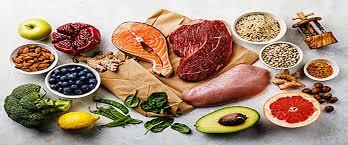- Published Date: 29-01-2025

In the world of sports, injuries are an unfortunate reality. Injuries can hinder an athlete's performance and disrupt their training regimen, whether it’s a sprained ankle, a torn ligament, or a muscle strain.
While physical rehabilitation and rest are crucial components of recovery, nutrition plays an equally vital role that is often overlooked. Understanding the connection between nutrition and injury recovery can help athletes bounce back faster and more effectively.
Nutrition provides the building blocks necessary for healing. When an athlete sustains an injury, the body goes into repair mode. This requires an increase in the intake of certain nutrients to support tissue repair, reduce inflammation, and restore overall health. Adequate nutrition can facilitate quicker recovery times, allowing athletes to return to training and competition sooner.
1. Proteins: The Building Blocks of Tissue Repair
Proteins are essential for muscle repair and growth. When an athlete is injured, their body requires more protein to rebuild damaged tissues and promote recovery. Amino acids, the building blocks of proteins, play a crucial role in healing.
Athletes are generally advised to consume between 1.2 to 2.0 grams of protein per kilogram of body weight, depending on the severity of the injury and the level of physical activity permitted during recovery. Quality sources of protein include lean meats, fish, eggs, dairy products, legumes, and plant-based proteins like quinoa and tofu.
2. Carbohydrates: Fueling Recovery
Carbohydrates are often seen as just a source of energy, but they are equally important for recovery. They help replenish glycogen stores that are depleted during workouts and can support the immune system, which can be compromised during periods of injury.
Consuming adequate carbohydrates ensures that athletes have the energy needed for rehabilitation exercises, which are critical for recovery. Complex carbohydrates such as whole grains, fruits, and vegetables should form the bulk of an athlete's diet. These foods not only provide energy but also offer essential vitamins and minerals that contribute to overall health.
Healthy fats are integral in reducing inflammation and promoting healing. Omega-3 fatty acids, in particular, have been shown to have anti-inflammatory effects. Food sources rich in omega-3 include fatty fish (like salmon and mackerel), walnuts, flaxseeds, and chia seeds. It’s essential to keep fat intake balanced, focusing on unsaturated fats while moderating saturated and trans fats, which can contribute to inflammatory processes.
Micronutrients, such as vitamins and minerals, play essential roles in the recovery process:
Vitamin C is crucial for collagen synthesis, which is necessary for the repair of connective tissues, muscles, and skin. It’s found in citrus fruits, strawberries, bell peppers, and leafy greens. Zinc supports the immune system and is vital for cell division and growth. Foods high in zinc include lean meats, shellfish, legumes, seeds, and whole grains.
For athletes sustaining bone injuries, vitamin D and calcium are vital for healing. Vitamin D aids in calcium absorption and helps maintain bone density. Sun exposure is a natural method to get vitamin D, but it can also be found in fortified foods and fatty fish. Calcium is necessary for bone repair and is abundant in dairy products, leafy greens, and fortified plant-based milks.
Antioxidants such as vitamins A, C, and E can help combat oxidative stress caused by injury and inflammation. Foods such as berries, nuts, and green leafy vegetables are rich in antioxidants and should be incorporated into an athlete’s diet during recovery.
Hydration: The Unsung Hero
In the context of recovery, hydration is another critical aspect that is frequently underestimated. Adequate fluid intake is essential for maintaining blood volume, regulating body temperature, and eliminating toxins from the body. Dehydration can delay recovery, as it impairs cellular functions and overall performance.
Athletes should aim to drink sufficient water, along with electrolyte-rich fluids, especially if they are undergoing rehabilitation exercises. Listening to the body’s thirst cues and monitoring urine color can help ensure optimal hydration levels.
Timing Matters
The timing of nutrient intake can also significantly affect recovery. Athletes are encouraged to consume a balanced meal or snack containing proteins and carbohydrates soon after sustaining an injury or completing a rehabilitation workout.
This is known as the "anabolic window," during which nutrient absorption is heightened, potentially enhancing recovery. For example, a post-workout shake with protein powder, banana, and nut butter can provide an excellent recovery boost. Likewise, planning meals around workout times can ensure that the body has the nutrients it needs to heal and rebuild.
Incorporating Supplements
While a well-balanced diet should provide most of the necessary nutrients, some athletes may find it beneficial to incorporate supplements, particularly when dealing with injuries. Protein powders, omega-3 supplements, and multivitamins can be useful additions. However, athletes must consult with healthcare professionals or registered dietitians before starting any supplementation, as individual needs can vary widely.
Recognizing the intricate relationship between nutrition and injury recovery empowers athletes to take an active role in their rehabilitation. By focusing on a balanced intake of macronutrients and micronutrients, maintaining proper hydration, and timing nutrient intake appropriately, athletes can optimize their recovery process.
In the long run, investing in nutrition not only facilitates faster recovery but also strengthens the overall resilience of an athlete, paving the way for sustained performance and reduced injury risk in the future. Remember, healing is not just about physical therapy; it’s also about nourishing the body back to health.